单独考试英语考试大纲-同济大学研究生招生网
全国硕士研究生招生考试英语(一)考试大纲
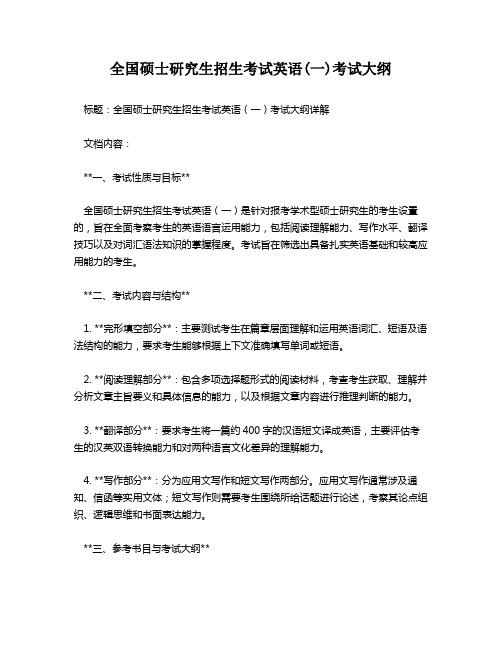
全国硕士研究生招生考试英语(一)考试大纲标题:全国硕士研究生招生考试英语(一)考试大纲详解文档内容:**一、考试性质与目标**全国硕士研究生招生考试英语(一)是针对报考学术型硕士研究生的考生设置的,旨在全面考察考生的英语语言运用能力,包括阅读理解能力、写作水平、翻译技巧以及对词汇语法知识的掌握程度。
考试旨在筛选出具备扎实英语基础和较高应用能力的考生。
**二、考试内容与结构**1. **完形填空部分**:主要测试考生在篇章层面理解和运用英语词汇、短语及语法结构的能力,要求考生能够根据上下文准确填写单词或短语。
2. **阅读理解部分**:包含多项选择题形式的阅读材料,考查考生获取、理解并分析文章主旨要义和具体信息的能力,以及根据文章内容进行推理判断的能力。
3. **翻译部分**:要求考生将一篇约400字的汉语短文译成英语,主要评估考生的汉英双语转换能力和对两种语言文化差异的理解能力。
4. **写作部分**:分为应用文写作和短文写作两部分。
应用文写作通常涉及通知、信函等实用文体;短文写作则需要考生围绕所给话题进行论述,考察其论点组织、逻辑思维和书面表达能力。
**三、参考书目与考试大纲**考生应参照《全国硕士研究生入学统一考试英语(一)考试大纲》进行系统复习,大纲详细列出了各部分的考试要求、题型示例以及推荐的学习参考资料。
同时,建议考生广泛阅读各类英文原著、期刊文献以提高英语综合素养。
**四、备考策略**考生应注重词汇的记忆积累,提升长难句解析能力,精读与泛读结合提高阅读速度和理解精度,定期进行翻译和写作练习,不断锤炼语言输出技能。
同时,关注社会热点问题,锻炼用英语思考和表达的能力。
总结来说,全国硕士研究生招生考试英语(一)既是对考生英语基础知识的检验,也是对其实际运用能力的考察。
希望广大考生能依据考试大纲,制定科学合理的复习计划,全面提升自身的英语水平和应用能力。
全国硕士研究生招生考试英语一考试大纲

全国硕士研究生招生考试英语一考试大纲National Postgraduate Entrance Examination (NPEE) English Test OutlineIntroduction:The National Postgraduate Entrance Examination (NPEE) is an important exam for Chinese students seeking admission to postgraduate programs. The English test is a crucial part of the exam, designed to assess the English proficiency of the candidates. This document outlines the key components of the NPEE English test and provides some tips for preparing for the exam.Test Format:The NPEE English test consists of four parts: listening, reading, writing, and translation. Each part is designed to evaluate different skills and aspects of the candidates' English proficiency.1. Listening:The listening section of the NPEE English test includes multiple-choice questions based on recorded conversations and dialogues. Candidates are required to listen carefully and choosethe correct answer based on the information presented in the recordings.Tip: Practice listening to different accents and speeds of English speakers to improve your listening skills.2. Reading:The reading section of the NPEE English test includes multiple-choice questions, fill-in-the-blank exercises, and essay questions. Candidates are required to read and understand passages on various topics, including literature, science, and current affairs.Tip: Read a variety of English texts, including newspapers, magazines, and academic journals, to improve your reading comprehension skills.3. Writing:The writing section of the NPEE English test requires candidates to write essays on assigned topics. Candidates are assessed on their ability to present arguments, organize ideas, and use correct grammar and vocabulary.Tip: Practice writing essays on different topics and have them reviewed by a teacher or tutor to improve your writing skills.4. Translation:The translation section of the NPEE English test requires candidates to translate sentences from Chinese to English and vice versa. Candidates are assessed on their ability to accurately convey the meaning of the original text in the target language.Tip: Practice translating sentences and passages between Chinese and English to improve your translation skills.Preparation Tips:1. Start preparing early: Begin studying for the NPEE English test as soon as possible to give yourself enough time to improve your English proficiency.2. Practice regularly: Make a study schedule and practice listening, reading, writing, and translation exercises on a daily basis.3. Seek help: Consider hiring a tutor or attending English classes to receive personalized instruction and feedback on your language skills.4. Take practice tests: Familiarize yourself with the format and types of questions on the NPEE English test by taking practice tests and reviewing your answers.5. Stay confident: Believe in your abilities and stay positive throughout your preparation and during the exam.In conclusion, the NPEE English test is an important component of the National Postgraduate Entrance Examination and requires candidates to demonstrate their English proficiency in listening, reading, writing, and translation. By following the tips outlined in this document and dedicating time and effort to your preparation, you can improve your chances of success on the exam. Good luck!。
2024年博士研究生入学考试英语考试大纲

2024年博士研究生入学考试英语考试大纲2024 Doctoral Graduate Entrance Examination English Exam OutlineI. Listening ComprehensionThis section of the exam will test the candidates' ability to understand spoken English in academic and professional settings. Candidates will listen to a series of recordings, including lectures, conversations, and presentations, and answer multiple-choice questions based on the content. The topics will cover a wide range of subjects relevant to doctoral studies, such as research methods, literature reviews, and academic discussions.II. Reading ComprehensionIn this section, candidates will read academic texts, including scholarly articles, research papers, and book excerpts, and answer questions to demonstrate their understanding of the content. The passages will be of varying lengths and complexity, requiring candidates to identify main ideas, supporting details, and logical relationships within the text.III. Writing SkillsCandidates will be required to demonstrate their ability to write coherent and well-structured essays on a variety of topics related to their field of study. This section will test candidates' proficiency in academic writing, including the ability to formulate clear arguments, provide evidence to support their claims, and organize their ideas in a logical manner. Candidates may be asked to analyze a case study, evaluate a research question, or propose a research methodology.IV. Vocabulary and GrammarThis section will assess candidates' knowledge of vocabulary and grammar in academic English. Candidates will be tested on their ability to use complex vocabulary and grammar structures accurately and appropriately in written and spoken English. This section may include exercises on word meaning, word usage, sentence structure, and grammatical rules.V. Speaking SkillsCandidates will be required to engage in conversations and discussions on academic topics with examiners. This section will test candidates' ability to express ideas clearly and coherently, respond to questions, and engage in academic discourse. Candidates will be evaluated on their fluency, pronunciation, vocabulary usage, and grammar accuracy.Overall, the 2024 Doctoral Graduate Entrance Examination English Exam is designed to assess candidates' readiness for doctoral studies by evaluating their listening, reading, writing, speaking, vocabulary, and grammar skills in academic English. Candidates are encouraged to prepare thoroughly for the exam by practicing listening and reading comprehension, academic writing, vocabulary building, and speaking skills in English. Good luck to all the candidates!。
全国硕士研究生招生考试英语(二)考试大纲(非英语专业)
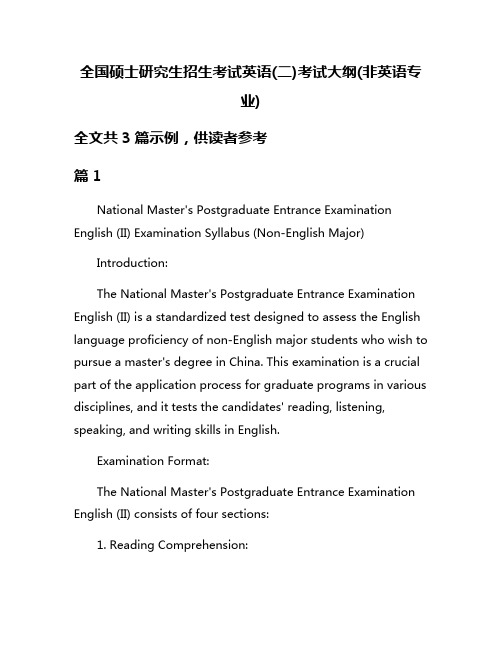
全国硕士研究生招生考试英语(二)考试大纲(非英语专业)全文共3篇示例,供读者参考篇1National Master's Postgraduate Entrance Examination English (II) Examination Syllabus (Non-English Major)Introduction:The National Master's Postgraduate Entrance Examination English (II) is a standardized test designed to assess the English language proficiency of non-English major students who wish to pursue a master's degree in China. This examination is a crucial part of the application process for graduate programs in various disciplines, and it tests the candidates' reading, listening, speaking, and writing skills in English.Examination Format:The National Master's Postgraduate Entrance Examination English (II) consists of four sections:1. Reading Comprehension:This section assesses the candidates' ability to understand and analyze written texts. The candidates will be required to answer multiple-choice questions based on a series of passages on various topics, such as science, history, literature, and social issues.2. Listening Comprehension:In this section, the candidates will listen to a series of recordings and answer multiple-choice questions based on the content of the recordings. The recordings may include conversations, lectures, and news reports.3. Speaking:The speaking section evaluates the candidates' ability to express their ideas and opinions in English. The candidates will be asked to respond to prompts on various topics and engage in discussions with the examiners.4. Writing:The writing section tests the candidates' ability to write coherent and well-organized essays in English. The candidates will be required to write an essay on a given topic within a specified time limit.Preparation Strategies:To excel in the National Master's Postgraduate Entrance Examination English (II), candidates should adopt the following preparation strategies:1. Practice regularly: Candidates should practice reading, listening, speaking, and writing in English on a daily basis to improve their language skills.2. Familiarize themselves with the examination format: Candidates should understand the format of the examination and practice past papers to become familiar with the types of questions that may appear on the test.3. Expand their vocabulary: Candidates should learn new words and phrases in English to enhance their ability to understand and express themselves effectively.4. Seek feedback: Candidates should seek feedback from teachers, tutors, or peers to improve their language proficiency and address any weaknesses in their English skills.Conclusion:The National Master's Postgraduate Entrance Examination English (II) is an important test for non-English major students who aspire to pursue a master's degree in China. By preparing systematically and diligently for the examination, candidates canenhance their English language skills and improve their chances of success in the competitive application process for graduate programs.篇2National Master's Entrance Examination in English(Non-English Major) Exam OutlineI. IntroductionThe National Master's Entrance Examination in English (Non-English Major) is a standardized test designed to evaluate the English language proficiency of non-English major graduate students in China. The exam is an important criterion for admission to various master's programs in English-speaking countries or other programs that require English language proficiency.II. Exam ContentThe exam consists of four sections: listening, reading, writing, and speaking. Each section tests different language skills and abilities, allowing for a comprehensive evaluation of the candidate's English proficiency.1. Listening:The listening section assesses the candidate's ability to understand spoken English in various contexts, including academic lectures, conversations, and radio broadcasts. Candidates are required to answer multiple-choice questions based on the audio materials they hear.2. Reading:The reading section tests the candidate's comprehension of written English texts, such as academic articles, essays, and reports. Candidates are expected to answer questions that assess their ability to analyze and interpret the information presented in the texts.3. Writing:The writing section evaluates the candidate's ability to express ideas clearly and coherently in written English. Candidates are asked to write essays or reports on given topics, demonstrating their skills in argumentation, logic, and organization.4. Speaking:The speaking section examines the candidate's ability to communicate effectively in spoken English. Candidates are required to participate in conversations, role-plays, orpresentations, demonstrating their fluency, pronunciation, and accuracy in speaking.III. Exam FormatThe exam is conducted in a computer-based format, with different sections administered at specified times. Candidates are allotted a specific amount of time for each section, with breaks provided between sections to ensure optimal performance.IV. ScoringThe exam is scored on a scale from 0 to 100, with each section weighted differently. The final score is a composite of the scores obtained in each section, providing an overall assessment of the candidate's English proficiency level.V. PreparationTo prepare for the National Master's Entrance Examination in English (Non-English Major), candidates are advised to practice regularly and familiarize themselves with the exam format and content. They can use study materials, attend preparatory courses, or seek guidance from English language tutors to improve their language skills.In conclusion, the National Master's Entrance Examination in English (Non-English Major) is a crucial assessment that determines the English language proficiency of non-English major graduate students seeking admission to master's programs. By understanding the exam outline, content, format, scoring, and preparation strategies, candidates can effectively prepare for the exam and increase their chances of success.篇3National Master's Entrance Examination English (Part II) Syllabus (Non-English Major)1. Listening Comprehension (30%)Part A: Listen and select the best response to the question you hear. (5 points)Part B: Listen and choose the best answer to the question you hear. (10 points)Part C: Listen and choose the statement that best summarizes the passage you hear. (5 points)Part D: Listen and choose the correct speaker for each statement. (5 points)Part E: Listen and fill in the blanks with the missing information you hear. (5 points)2. Grammar and Vocabulary (30%)Part A: Choose the word or phrase that best completes the sentence. (10 points)Part B: Choose the word(s) or phrase(s) that best explain the underlined word(s) or phrase(s). (10 points)Part C: Choose the word(s) or phrase(s) that best fits the blank in the sentence. (10 points)3. Reading Comprehension (30%)Part A: Read the passage and answer the questions. (10 points)Part B: Read the passage and fill in the blanks with the correct words or phrases. (10 points)Part C: Read the passage and choose the statement that best summarizes the passage. (10 points)4. Writing (10%)Part A: Write an article on a given topic. (10 points)Total: 100 pointsNote: The above exam syllabus is subject to change based on the examination committee's decision. Candidates are advised to prepare thoroughly by practicing sample questions and familiarizing themselves with the exam format. Good luck with your preparation!。
2024年英语一考研大纲
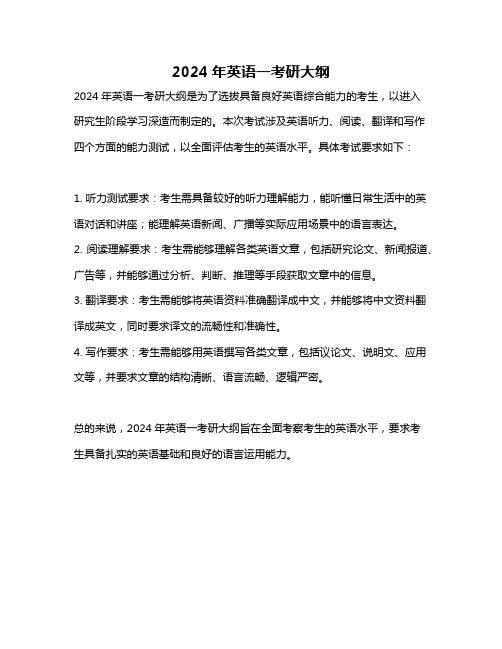
2024年英语一考研大纲
2024年英语一考研大纲是为了选拔具备良好英语综合能力的考生,以进入
研究生阶段学习深造而制定的。
本次考试涉及英语听力、阅读、翻译和写作四个方面的能力测试,以全面评估考生的英语水平。
具体考试要求如下:
1. 听力测试要求:考生需具备较好的听力理解能力,能听懂日常生活中的英语对话和讲座;能理解英语新闻、广播等实际应用场景中的语言表达。
2. 阅读理解要求:考生需能够理解各类英语文章,包括研究论文、新闻报道、广告等,并能够通过分析、判断、推理等手段获取文章中的信息。
3. 翻译要求:考生需能够将英语资料准确翻译成中文,并能够将中文资料翻译成英文,同时要求译文的流畅性和准确性。
4. 写作要求:考生需能够用英语撰写各类文章,包括议论文、说明文、应用文等,并要求文章的结构清晰、语言流畅、逻辑严密。
总的来说,2024年英语一考研大纲旨在全面考察考生的英语水平,要求考
生具备扎实的英语基础和良好的语言运用能力。
2024年考研201英语一考试大纲原文
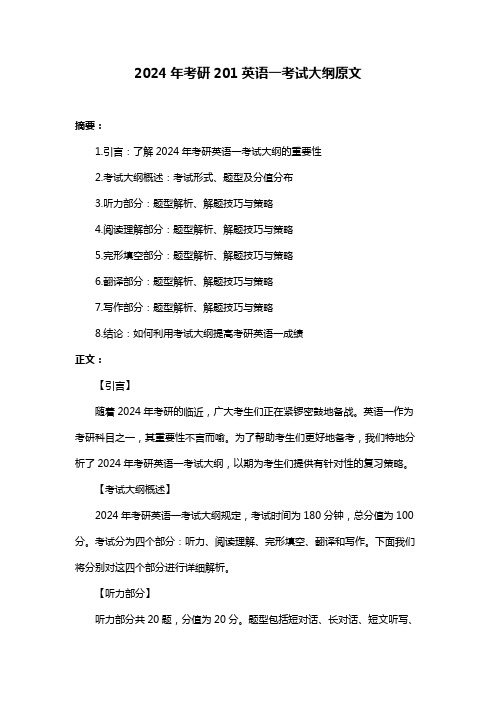
2024年考研201英语一考试大纲原文摘要:1.引言:了解2024年考研英语一考试大纲的重要性2.考试大纲概述:考试形式、题型及分值分布3.听力部分:题型解析、解题技巧与策略4.阅读理解部分:题型解析、解题技巧与策略5.完形填空部分:题型解析、解题技巧与策略6.翻译部分:题型解析、解题技巧与策略7.写作部分:题型解析、解题技巧与策略8.结论:如何利用考试大纲提高考研英语一成绩正文:【引言】随着2024年考研的临近,广大考生们正在紧锣密鼓地备战。
英语一作为考研科目之一,其重要性不言而喻。
为了帮助考生们更好地备考,我们特地分析了2024年考研英语一考试大纲,以期为考生们提供有针对性的复习策略。
【考试大纲概述】2024年考研英语一考试大纲规定,考试时间为180分钟,总分值为100分。
考试分为四个部分:听力、阅读理解、完形填空、翻译和写作。
下面我们将分别对这四个部分进行详细解析。
【听力部分】听力部分共20题,分值为20分。
题型包括短对话、长对话、短文听写、篇章听力等。
在备考过程中,考生需注意以下几点:1.掌握各类题型的解题技巧;2.提高英语听力水平,尤其是口语发音和语调;3.培养快速笔记的能力,以便在听录音时能迅速捕捉关键信息。
【阅读理解部分】阅读理解部分共20题,分值为40分。
题型包括事实细节题、推理判断题、主旨大意题等。
为提高阅读理解得分,考生需:1.熟练掌握各类题型的解题技巧;2.扩大词汇量,提高阅读速度;3.培养文章脉络分析能力,迅速把握文章结构。
【完形填空部分】完形填空部分共20题,分值为20分。
题型为填空题,要求考生根据文章内容填写合适的单词。
为提高完形填空得分,考生需:1.掌握常用词汇和短语,尤其是固定搭配;2.培养快速阅读能力,把握文章主题;3.分析句子结构,注意上下文关系。
【翻译部分】翻译部分共1题,分值为25分。
题型为英汉互译,涉及政治、经济、文化、科技等领域。
考生在备考时应注意:1.熟练掌握各类句型和翻译技巧;2.提高英语表达能力,尤其是口语和书面表达;3.积累专业词汇和表达,以便在考试中能迅速翻译。
2024考研大纲英语一

2024考研大纲英语一【原创版】目录1.2024 考研英语一考试大纲的发布背景2.考试大纲的重要性3.2024 考研英语一考试大纲的主要内容4.考生如何依据大纲进行复习5.深大考研信息网的相关资讯和辅导班正文2024 考研大纲英语一的发布背景随着 2024 年全国硕士研究生招生工作的启动,考研大纲作为指导考生备考的重要文件也已发布。
考研大纲是由教育部考试中心制定的,旨在为考生提供复习备考的指导,帮助考生了解考试范围、题型及分值等信息。
对于 2024 年考研英语一的大纲,我们可以从中了解到一些有关考试的最新信息。
考试大纲的重要性考试大纲是考生备考过程中必不可少的参考文件。
它为考生提供了关于考试范围、考试形式、试题分值等重要信息,有助于考生明确复习重点,合理安排复习计划,提高复习效率。
考生在备考过程中需要根据大纲要求,系统学习各科目知识,掌握考试要点,为考试做好充分的准备。
2024 考研英语一考试大纲的主要内容根据 2024 考研英语一考试大纲,我们可以发现与往年相比,大纲变动不大。
英语一考试主要分为听力、阅读理解、完形填空、翻译和作文等五个部分。
各部分的分值和题型基本与往年保持一致。
具体来说:1.听力部分:包括短文听力和长对话听力,短文听力要求考生听懂短文的主旨和细节;长对话听力要求考生听懂对话双方的观点和意图。
2.阅读理解部分:包括传统阅读和阅读新题型,传统阅读要求考生理解文章的主旨、细节和推断;阅读新题型要求考生根据文章的逻辑关系,完成相应的题目。
3.完形填空部分:要求考生根据上下文和语法知识,选择最佳选项填入文章中,使文章意思完整、通顺。
4.翻译部分:要求考生将中文翻译成英文或英文翻译成中文,考查考生的语言表达能力和翻译技巧。
5.作文部分:包括大作文和小作文,大作文要求考生根据给定话题进行论述;小作文要求考生根据给定情景,完成相应的写作任务。
考生如何依据大纲进行复习面对 2024 考研英语一考试大纲,考生需要制定合理的复习计划,并根据大纲要求进行针对性的复习。
同济大学博士研究生英语综合水平考试大纲(全)
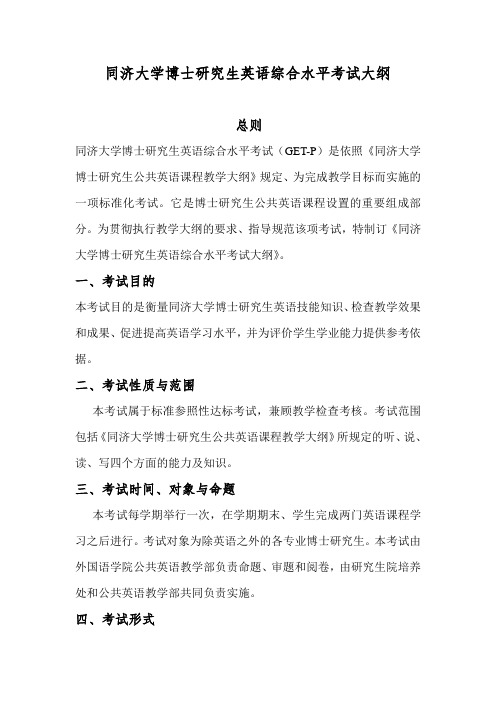
同济大学博士研究生英语综合水平考试大纲总则同济大学博士研究生英语综合水平考试(GET-P)是依照《同济大学博士研究生公共英语课程教学大纲》规定、为完成教学目标而实施的一项标准化考试。
它是博士研究生公共英语课程设置的重要组成部分。
为贯彻执行教学大纲的要求、指导规范该项考试,特制订《同济大学博士研究生英语综合水平考试大纲》。
一、考试目的本考试目的是衡量同济大学博士研究生英语技能知识、检查教学效果和成果、促进提高英语学习水平,并为评价学生学业能力提供参考依据。
二、考试性质与范围本考试属于标准参照性达标考试,兼顾教学检查考核。
考试范围包括《同济大学博士研究生公共英语课程教学大纲》所规定的听、说、读、写四个方面的能力及知识。
三、考试时间、对象与命题本考试每学期举行一次,在学期期末、学生完成两门英语课程学习之后进行。
考试对象为除英语之外的各专业博士研究生。
本考试由外国语学院公共英语教学部负责命题、审题和阅卷,由研究生院培养处和公共英语教学部共同负责实施。
四、考试形式本考试分书面纸质考试和口试两部分;考试秉持测试的客观性和可行性,采用有效试题形式,并保证考试的效度和信度。
五、考试内容书面考试题项包含三部分:听力理解、阅读理解和短文写作。
考试规定时间120分钟。
听力理解(Listening Comprehension)1、测试要求:(a)能听懂日常交际场合中的各种英语会话和交谈。
(b)能听懂英语时事新闻的报道、报告。
(c)能听懂有关历史、文化、教育、科学等方面的英语故事和介绍。
(d)考试时间约20分钟。
2、测试形式:(a)本部分采用多项选择题形式,分两节:Section A与Section B,共20题。
(b) Section A (Listening Conversations) 由10个对话组成,共10题,题后有10秒间隙。
(c) Section B (Listening Passages) 由3篇短文组成,每篇长度约250单词,共10题,题后有10秒间隙。
- 1、下载文档前请自行甄别文档内容的完整性,平台不提供额外的编辑、内容补充、找答案等附加服务。
- 2、"仅部分预览"的文档,不可在线预览部分如存在完整性等问题,可反馈申请退款(可完整预览的文档不适用该条件!)。
- 3、如文档侵犯您的权益,请联系客服反馈,我们会尽快为您处理(人工客服工作时间:9:00-18:30)。
同济大学2018年硕士研究生入学单独考试英语考试大纲
总则
考试主要以《大学英语教学大纲(文、理科本科用)》中对大学英语四级水平的具体要求为根据,测试考生在英语语法、词汇、阅读及翻译等方面的语言应用能力。
考试内容与形式
整份试卷包括试卷一(选择题)和试卷二(非选择题)。
试卷一含以下三个部分:
第一部分词语用法和语法结构(Part I Vocabulary and Structure)共20题,考试时间为15分钟。
本部分全部是多项选择题。
跟词语用法相关的题目主要测试考生运用英语词语及短语的能力,考试范围为大学英语四级标准所含的词汇和短语。
跟语法结构相关的题目主要测试考生掌握英语语法结构的程度,考试范围包括大学英语四级标准所含的语法内容。
答题时,考生需在答题纸上按照要求填涂相应字母。
第二部分阅读理解(Part II Reading Comprehension)
共20题,考试时间为65分钟。
要求考生阅读4篇英语文章,总阅读量为1500词左右。
每篇文章后有若干问题,考生应根据文章内容从每题四个选择项中选出一个最佳答案。
选题的原则是:
1、体裁多样,可以包括叙述文、说明文、议论文等。
文章所涉及的背景知识能为普通大学生理解。
2、文章的语言难度相当于国家大学英语四级统考的相应考题,但篇幅略长。
无法猜测而又影响理解的关键词,如超出考生应掌握的词汇范围,用汉语注明词义。
阅读理解部分主要测试上述能力:
A. 掌握所读文章的主旨和大意;
B. 了解说明主旨和大意的事实和细节;
C. 既理解字面意思,又能根据所读材料进行一定的判断和推论。
第三部分完形填空(Part III Cloze)
共20题,考试时间为35分钟。
完形填空所用的文章长度为300词左右,难度略低于阅读理解的篇章。
文中共有20处空白,每个空白有四个选项。
考生需在所给的四个选项中选一个词或词组进行填空。
完形填空的目的是测试考生综合应用英语的能力。
试卷二含以下两个部分(在整份试卷中为第四和第五部分):
第四部分汉译英(Part I Chinese-English Translation)
共5题,考试时间为30分钟。
考生需将英语译文写在答题纸相应的位置上。
供翻译的中文句子具有以下特点:
1. 难度适当,不含冷僻词或专业性过强的单词;
2. 长度适中,结构便于考生套用英语常用句型;
3. 各题互不相关,内容和句式兼顾文、理各科考生。
汉译英的目的是测试学生的英语书面表达能力。
第五部分英译汉(Part II English-Chinese Translation)
共5题,句子取自于短文。
英译汉所用的短文的长度为300词左右,难度与阅读理解的篇章相同。
考试时间为35分钟。
考生须在理解短文的基础上,把划线部分的英语句子译成中文,并将中文译文写在答题纸相应的位置上。
供翻译的英文句子具有以下特点:
1. 难度适当,不含冷僻词或专业性过强的单词;
2. 长度适中,结构应是英语常用句型;
3. 内容和句式兼顾文、理各科考生。
英译汉的目的是测试学生的理解和表达能力。
